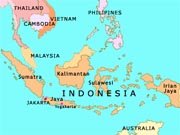Thousands of Muslims demand ban on "heretical" Islam
 Jakarta - Thousands of Indonesian Muslim militants demanded an immediate ban of an Islamic splinter group Sunday, accusing it of heresy for revering the sect's founder as a prophet after Mohammed.
Jakarta - Thousands of Indonesian Muslim militants demanded an immediate ban of an Islamic splinter group Sunday, accusing it of heresy for revering the sect's founder as a prophet after Mohammed.
The protestors came from several Islamic organizations including the hardline Islamic Defender Front, Hizbut Thahrir and the Islamic Community Forum, witnesses said.
They carried banners reading "The ban of Ahmadiyah is a fixed price," and postcards of Ahmadiyah founder Mirza Ghulam Ahmad with his face crossed out.
"We demand the government outlaw Ahmadiyah's teachings immediately," said protest leader Awith Mashuri.
Jakarta city police deployed about 1,000 personnel to guard the rally, which ended mid-day when the protestors dispersed peacefully.
Government authorities are drafting a decree to ban Ahmadiyah, based on a recommendation issued by the Coordinating Board for Monitoring Mystical Beliefs in Society, which branded the sect heretical.
Board chairman Wisnu Subroto, who is also deputy attorney general for intelligence, said the religious affairs and home affairs ministries were drafting a joint decree with the attorney general's office requiring Ahmadiyah followers to return to mainstream Islam.
Human rights activists called the recommendation a violation of constitutional rights, and urged the state to protect the sect's members.
In addition to demanding on the government to ban the group, militant Muslims launched attacks on individuals, properties, mosques and schools belonging to Ahmadiyah.
The Indonesian Ulema Council, the country's highest authority on Islam, in 2005 declared Ahmadiyah heretical for believing Mohammed was not the final prophet, but Mirza Ghulam Ahmad instead, contradicting a central tenet of mainstream Islam.
Ahmadiyah, or Jemaah Ahmadiyah Qadiyan, which was formed in Pakistan in the 19th century, is little known in Indonesia, with only an estimated 200,000 followers in the country.
Nearly 88 per cent of Indonesia's 225 million people are Muslim, with a long history of religious tolerance. But in recent years, hard-liners have grown bolder and the government - which relies on the support of Islamic parties in parliament - has been accused of bowing to them. (dpa)